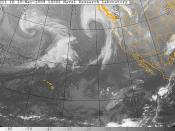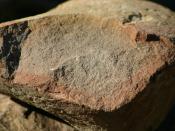Rocks that are exposed on the Earths surface are attacked by wind, water or ice. This process is called weathering. There are three types of weathering, mechanical, chemical and biological. Weathering takes place on exposed rock surfaces, at the junction between regolith and bedrock. Mechanical, chemical and biological weathering each includes several processes and all three types of weathering are at work in all environments, although their relative importance varies, such as water and temperature. The effect of weathering on rock is what produces soil. This complex process takes thousands of years; climate, vegetation and rock type determine what type of soil forms. Water is very important in most types of weathering and can speed up weathering processes however there are other factors involved in the process that could be more important.
The availability of water is a crucial factor, mainly in chemical weathering. All types of chemical weathering require water to take place, e.g.
acid rain. If there was no water than a chemical weathering cannot take place. It also applies to most mechanical and biological weathering. Mechanical weathering needs the water for processes such as freeze thaw and salt crystal growth and biological weathering needs water or it can not take place. For instance, if there was no water than plant roots would not be able to penetrate rock fissures and eventually break up the rock or push aside rocks for it won't be growing. Water plays a crucial role in all types of weathering forms especially chemical weathering. In wet climate chemical weathering mainly by rainwater is dominant. Water can control the rate of weathering. If there was lots of water than the process would be quicker. If there was no water than all the processes that require water would be useless and ineffective.
Water is...



Breif
good info but brief
1 out of 1 people found this comment useful.